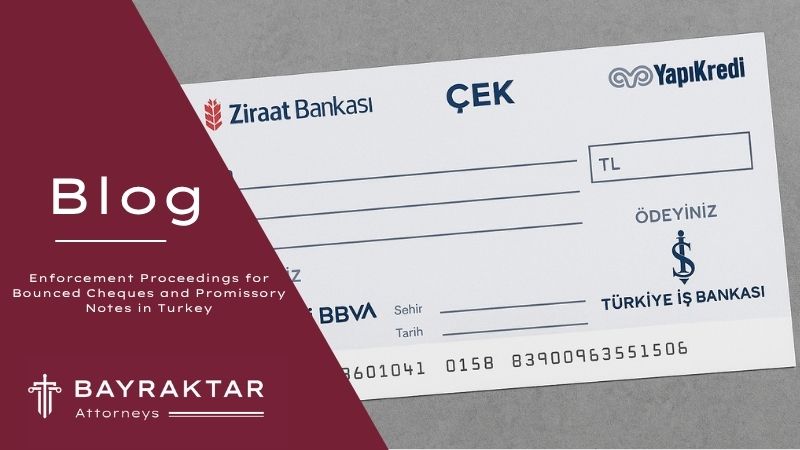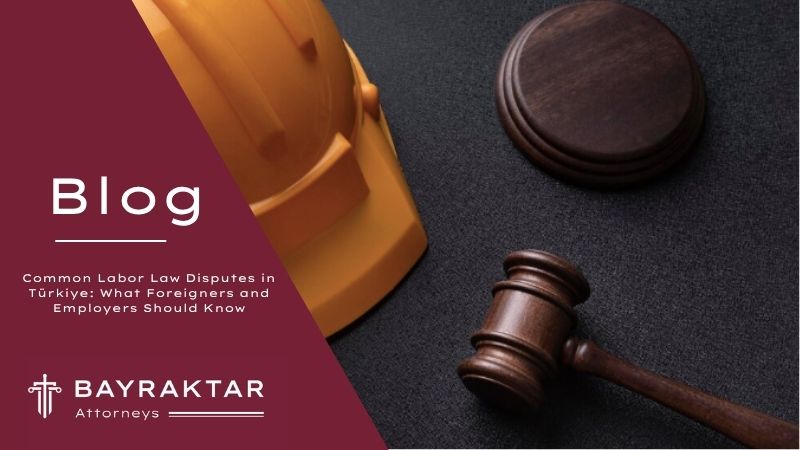
One of the most common concerns among individuals and businesses engaged in commercial transactions in Turkey is what happens when a cheque or promissory note goes unpaid. At Bayraktar Attorneys, we regularly assist both local and foreign clients in initiating and defending debt collection proceedings related to these instruments.
This guide provides essential information about how enforcement works, what to do in case of a bounced cheque, how to collect debt from a promissory note, and the key timelines and legal tools involved in the process.
Cheques vs. Promissory Notes – What’s the Difference?
Although frequently confused, cheques and promissory notes are legally distinct:
· A cheque is an official financial instrument issued by a bank, and when presented, the bank is obligated to pay.
· A promissory note (senet/bono), on the other hand, is privately prepared and signed by individuals or companies—payment relies on the issuer, not the bank.
What Is a Bounced Cheque?
A bounced cheque (karşılıksız çek) refers to a cheque that is presented to a bank but cannot be paid due to insufficient funds. In this case, the bank marks the cheque as “bounced,” and the holder may pursue legal and enforcement proceedings.
A cheque that meets legal requirements can be used to start specialized enforcement proceedings (kambiyo takibi), and in some cases, criminal complaints may also be filed. If proven guilty, the issuer may face judicial fines of up to 1,500 days per cheque.
How to Know if a Cheque Is Legally Valid
To be enforceable under Turkish law, a cheque must contain:
· The word “cheque” (çek) on the document
· An unconditional order to pay a specific amount
· The name of the bank (drawee)
· The date of issue (day, month, year)
· A handwritten signature from the drawer
If any of these are missing, the cheque loses its status as a negotiable instrument and cannot be enforced under specialized procedures.
Legal Remedies for a Bounced Cheque
If a cheque is submitted within its legal presentment period and bounces, the following can be claimed:
· The unpaid cheque amount
· Cheque compensation (10% of the unpaid amount)
· A small commission (not exceeding 0.3% of cheque value)
· Statutory interest from the date of presentment
· A fixed compensation of 3,600 TL per cheque leaf from the bank (as of January 2022)
Where to File Enforcement for a Bounced Cheque
Enforcement proceedings must be filed with a competent enforcement office based on:
· The location where the cheque was issued
· The branch of the drawee bank
· The registered address or residence of the debtor
The debtor has 5 days to object by filing a claim with the Enforcement Court. If there is no objection, the debtor must pay within 10 days or provide a statement of assets. Otherwise, the creditor may proceed with seizure and enforcement measures.
Time Limit for Enforcement of a Bounced Cheque
The cheque must be presented to the bank within the legal timeframe and, if unpaid, enforced within 3 years from that date. This period is a limitation period under Turkish law.
How to Collect an Unpaid Promissory Note
If the document is a promissory note (bono) or bill of exchange, and it meets the formal legal conditions, it may be enforced using specialized enforcement procedures.
However, if the document is not formally valid as a negotiable instrument, enforcement can still be pursued through general debt collection procedures.
Objecting to Enforcement Based on a Promissory Note
To halt enforcement, the debtor must file an objection within 5 days before the Enforcement Court. Grounds may include:
· The debt has already been paid
· The signature is forged or unauthorized
· The document does not qualify as a valid promissory note
Required Elements of a Valid Promissory Note
To qualify as a negotiable instrument, a promissory note must contain:
· The word “bono” or “promissory note”
· An unconditional promise to pay a specific amount
· The name of the payee
· The due date and place of payment
· The date and place of issue
· The issuer’s signature
Missing any of these elements can disqualify the document from being enforced through specialized procedures.
Final Thoughts
As can be seen, cheque and promissory note enforcement in Turkey is a legally complex and time-sensitive process. It requires careful evaluation of the document’s legal validity and strategic enforcement planning.
At Bayraktar Attorneys, our experienced team assists clients across Turkey and internationally in enforcing or defending cheque and promissory note claims. We represent investors, companies, and individuals in collection and enforcement proceedings, ensuring maximum recovery and legal protection.
📞 Contact us today to discuss your case and explore the best legal solutions tailored to your specific situation.






